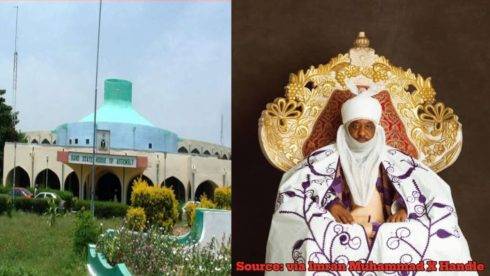The Kano State House of Assembly’s decision to reassess the controversial government decree that divided the state into five emirates in 2019 is a significant development in the state’s political landscape. The decree, passed during the previous administration, established four new emirates in addition to the ancient Kano Emirate, sparking widespread criticism from various stakeholders.
The criticism centered on the unconstitutionality of creating new emirates, which was seen as a move aimed at weakening the influence of the traditional Kano Emirate. The reassessment comes as a response to the concerns raised by stakeholders, and its outcome is eagerly awaited. The move has the potential to reshape the state’s political and cultural landscape, and its implications are being closely watched by all interested parties.
Kano State House of Assembly: New Emirates Created in 2019
In 2019, the Kano State Government made a significant move by establishing four new emirates – Gaya, Rano, Karaye, and Bichi – in addition to the existing Kano Emirate. This decision was seen as a palpable attempt to decentralize power and promote development in the state, aiming to bring governance closer to the people and foster economic growth.
However, the creation of new emirates was met with fierce resistance from the Kano Emirate Council and other stakeholders, who argued that it violated the state’s cultural and historical heritage. The controversy has been ongoing for several years, with many calling for a reassessment of the decree. The move was seen as a threat to the traditional authority of the Kano Emirate, sparking widespread criticism and debate. The ongoing debate highlights the need for a balanced approach to development and cultural preservation.
Kano State House of Assembly: Reassessment Sparks Hope and Concern
The announcement to reassess the decree has created a mix of emotions among stakeholders in Kano State, with hope and concern existing in equal measure. On one hand, many are optimistic that the reassessment will lead to a reversal of the controversial decision, restoring the Kano Emirate’s influence and traditional authority. This outcome would be seen as a victory for those who have long advocated for the preservation of the state’s cultural heritage.
On the other hand, others are skeptical, viewing the reassessment as a political move aimed at appeasing certain interests rather than a genuine attempt to address the concerns of the people. As the outcome of the reassessment is eagerly awaited, the state’s political and cultural landscape hangs in the balance. The decision will have far-reaching implications, shaping the future of the Kano Emirate and the state’s governance structure.
Kano State House of Assembly: Kano Emirate Council Welcomes Reassessment
The Kano Emirate Council has expressed its satisfaction with the decision to reassess the decree, hailing it as a step in the right direction. The council has consistently opposed the creation of new emirates, viewing it as a threat to the traditional authority and influence of the Kano Emirate. By welcoming the reassessment, the council is hopeful that the state government will finally address its concerns and restore the emirate’s rightful status.
The council’s spokesperson has expressed optimism that the reassessment will lead to a reversal of the decree, reinstating the Kano Emirate’s influence and authority. The council has pledged to collaborate closely with the state government to ensure a favorable outcome, demonstrating its commitment to finding a resolution that respects the state’s cultural heritage. With the council’s support, the reassessment is poised to be a significant turning point in the state’s political landscape.
State Government Promises Transparency
The Kano State Government has pledged transparency in the reassessment process, ensuring that stakeholders’ concerns are heard and addressed. By establishing a committee to review the decree, the government has demonstrated its commitment to a fair and impartial process. The committee’s mandate to engage with various stakeholders, including the Kano Emirate Council, traditional leaders, and civil society organizations, further reinforces the government’s promise of inclusivity and transparency.
As the reassessment process unfolds, the government’s assurance of a fair and impartial approach is expected to foster trust among stakeholders. By engaging with diverse perspectives, the committee will be able to make informed recommendations for the revision or repeal of the decree. With transparency and inclusivity at its core, the reassessment process is poised to be a significant milestone in Kano State’s political landscape, promoting accountability and good governance.
Reassessment Outcome Awaits
The outcome of the reassessment is highly anticipated by stakeholders in Kano State, as it holds significant implications for the state’s political and cultural landscape. The decision will have far-reaching consequences, shaping the future of the emirates and the state’s governance structure. As the state government and the Kano Emirate Council navigate this critical process, many are eagerly watching, aware that the outcome will determine the fate of the controversial decree and the future of the Kano Emirate.
The stakes are high, and the tension is palpable as stakeholders await the outcome of the reassessment. Will the decree be revised or repealed, restoring the Kano Emirate’s influence? Or will the state government uphold the status quo, perpetuating the controversy? The answer will have a profound impact on Kano State’s political and cultural landscape, making this reassessment a pivotal moment in the state’s history.
Table of Contents
Discover more from OGM News NG
Subscribe to get the latest posts sent to your email.














